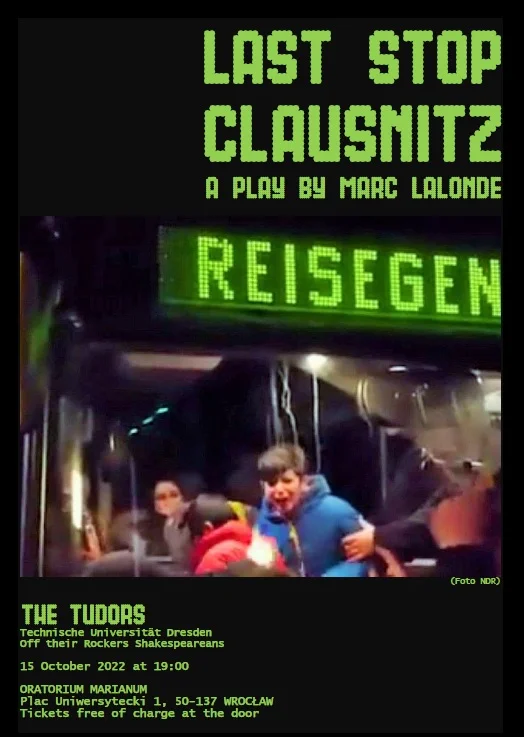
Zaproszenie na sztukę teatralną w języku angielskim
Instytut Filologii Angielskiej oraz Instytut Filologii Romańskiej UWr serdecznie zapraszają na spektakl teatralny w języku angielskim pt. Last Stop in Clausnitz w wykonaniu grupy teatralnej TUDORS (Technische Universität Dresden Off their Rockers Shakespeareans) z Uniwersytetu Technicznego w Dreźnie. Spektakl zostanie wystawiony w Oratorium Marianum w sobotę 15 października 2022 r. o godzinie 19.00, jest bezpłatny i stanowi doskonałą okazję do nieformalnej nauki języka angielskiego.
Autor sztuki i reżyser spektaklu, Marc Lalonde, jest wykładowcą języka angielskiego i francuskiego, pochodzi z Quebeku, od 20 lat mieszka w Dreźnie. Last Stop in Clausnitz to jego trzecia sztuka. Oparta jest na osobistych doświadczeniach związanych z relacjami między społeczeństwem niemieckim a imigrantami i uchodźcami. Dwóch aktorów spektaklu to uchodźcy z Syrii.
Premiera sztuki odbyła się 24 września br. w Dreźnie i spotkała z entuzjastycznym przyjęciem (fragment recenzji, która ukazała się w gazecie Sächsische Zeitung, w tłumaczeniu M. Lalonde’a poniżej).
Organizacja wydarzenia została wsparta przez Dziekana Wydziału Filologicznego UWr, prof. dr. hab. Arkadiusza Lewickiego.
Dodatkowych informacji udzielają:
dr Monika Grabowska: monika.grabowska@uwr.edu.pl dr Katarzyna Sówka-Pietraszewska: katarzyna.sowka_pietraszewska@uwr.edu.pl
Refugee stories (RECENZJA)
In the play “Last Stop: Clausnitz”, the four refugee stories that are told symbolise the fate of many who were forced to flee; all of whom having one thing in common: the hope of a better life.
By Lea Heilmann, Sächsische Zeitung, Dresden (27 September 2022)
The village of Clausnitz in the Ore Mountains, south of Dresden, became sadly famous six years ago when a bus of refugees was blocked by some of its citizens, who were shouting “We are the people”. Marc Lalonde spent two years in Clausnitz helping the refugees. He wrote the play “Last Stop: Clausnitz” based on their stories about leaving home, fleeing to and arriving in Germany.
The premiere was held in the Dresden University of Technology’s student movie theatre. A table and a few chairs were all The TUDORS, the English department’s theatre group, needed to tell the stories of four refugee couples. They all had different reasons to flee their homelands: war, religion, love. However, their goal was the same: Germany. The audience follows the couples one after the other until they all meet on the bus to Clausnitz. The play, performed in English, focuses mainly on the flight whereas the events in the village itself are just briefly mentioned. Although all this happened six years ago, the play is more than relevant today since many are again fleeing via the Mediterranean Sea to Europe and to Germany.
Despite dealing with a very serious topic, the play still offers several funny moments. When the refugees are confronted with the German culture, they ask themselves why the Germans eat so much pork, if they have ever heard of lamb, or if they still use toilet paper. The highlight of the play was the solo performance of Nasser Wannous, one of the two Syrian refugees to act in the cast. He clearly and critically deals with the role of rich countries in wars, he wonders about the incomprehensible distinction between safe and unsafe countries of origins, and tells the story of one who had to flee. At one point, reality and fiction seem to blend into each other, and we are not sure if he is still acting or actually telling us his own story.
There were five refugees in the audience who themselves were on the Clausnitz bus and whose stories inspired Lalonde to write his third play. At the end of the performance, all five stood on stage, happy and proud. Their stories represent those of so many others.
On the 13th of October, the theatre group will be performing again at the Chinese Pavilion in Dresden. Afterwards, The TUDORS will go international by putting on their play in Poland and in England.



